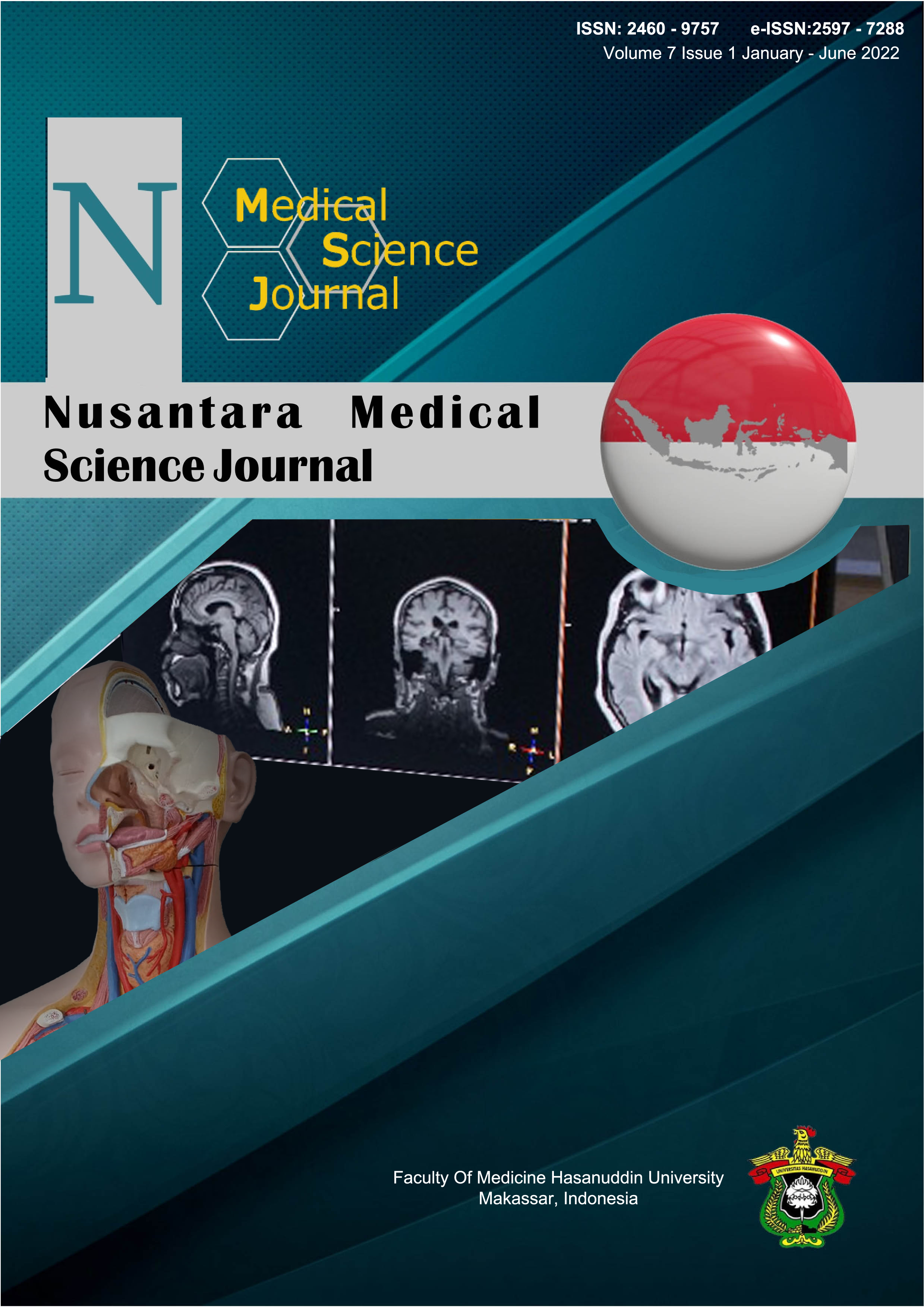Microbial Pattern and Sensitivity Analysis of Otitis Externa Patients in Makassar, Indonesia
DOI:
https://doi.org/10.20956/nmsj.v7i1.18910Abstract
Introduction: Globally, the cases of otitis externa were increased, followed by the incidence of antimicrobial resistance. Several factors, such as untrained medical health personnel and unprescribed antibiotics, are thought to play a major role in this phenomenon. This study aims to determine the bacterial patterns and antimicrobial sensitivity in otitis externa patients in Makassar, South Sulawesi, Indonesia. Methods: This cross-sectional study was conducted from November 2020 to February 2021 at Dr. Wahidin Sudirohusodo and Health Laboratory Center, Makassar, South Sulawesi, Indonesia. There were in total 33 subjects with otitis externa participating in this study. The secretion from the outer ear canal was taken and cultured using Mac Conkey agar for bacteriological examination and Vitek 2 for antimicrobial sensitivity. This study assessed age, sex, and type of otitis externa. All data analyses used SPSS version 26.00 (IBM Corp., Armonk, New York). Bacteria patterns and otitis externa were analyzed using the Fisher test. Results: Fourteen cases (42.4%) were caused by Pseudomonas Aeruginosa. Most Gram-negative bacteria were sensitive to ciprofloxacin, gentamicin, amikacin, and meropenem. Staphylococcus haemolyticus, Staphylococcus capitis, and Staphylococcus epidermidis were the most resistant Gram-positive bacteria. Aerobic bacteria in otitis externa were sensitive to antimicrobials (p<0.023). Conclusion: Gram-negative aerobic bacteria were common causes of otitis externa, with Pseudomonas aeruginosa being the most common isolated bacteria. Ciprofloxacin, gentamicin, amikacin, and meropenem were sensitive antimicrobials for otitis externa.
References
Schaefer P, Baugh RF. Acute otitis externa: an update. Am Fam Physician. 2012;86(11):1055-61.
Wiegand S, Berner R, Schneider A, Lundershausen E, Dietz A. Otitis Externa. Deutsches Arzteblatt international. 2019;116(13):224-34.
Rosenfeld RM, Schwartz SR, Cannon CR, Roland PS, Simon GR, Kumar KA, et al. Clinical practice guideline: acute otitis externa. Otolaryngology—Head and Neck Surgery. 2014;150(1_suppl):S1-S24.
Lian X, Lu G, Wang H. Pattern Formation in a Bacterial Colony Model. Abstract and Applied Analysis. 2014;2014:149801.
Hidayah AN, Hasmono D, Thayyib M, Kuntaman K. The Pattern of Antibiotic Prescription and Antimicrobial Resistance of Gut Flora Escherichia coli at Aisyiyah Hospital, Bojonegoro. Folia Medica Indonesiana. 2020;56(2):99-107.
Bitew Kifilie A, Dagnew M, Tegenie B, Yeshitela B, Howe R, Abate E. Bacterial profile, antibacterial resistance pattern, and associated factors from women attending postnatal health service at university of gondar teaching hospital, northwest ethiopia. Int J Microbiol. 2018;2018.
Agustina YS, Megantara I, Dermawan A. Pattern of Bacteria, Antibiotic Uses and Sensitivity among Ear, Nose, and Throat Infectious Disease in Otolaryngology Ward in Tertiary Hospital. International Journal of Integrated Health Sciences. 2019;7(1):39-47.
Fayyaz M, Mirza IA, Abbasi SA, Ikram A, Hussain A, Khan IU. Pattern of bacterial pathogens and their antimicrobial susceptibility from blood culture specimens in a tertiary care setting. Journal of Virology & Microbiology. 2015;4(10):1-33.
Kiakojuri K, Mahdavi Omran S, Jalili B, Hajiahmadi M, Bagheri M, Ferdousi Shahandashti E, et al. Bacterial Otitis Externa in Patients Attending an ENT Clinic in Babol, North of Iran. Jundishapur J Microbiol. 2016;9(2):e23093.
Rowlands S, Devalia H, Smith C, Hubbard R, Dean A. Otitis externa in UK general practice: a survey using the UK General Practice Research Database. Br J Gen Pract. 2001;51(468):533-8.
Suwu P, Kountul C, Waworuntu O. Pola Kuman dan Uji Kepekaannya Terhadap Antibiotika pada Penderita Otitis Eksterna di Poliklinik THT-KL BLU RSU PROF. DR. RD Kandou Manado. e-CliniC. 2013;1(1).
Musa TS, Bemu AN, Grema US, Kirfi AM. Pattern of otitis externa in Kaduna Nigeria. Pan Afr Med J. 2015;21(1).
Nogueira JCR, Diniz MdFFM, Lima EO, Lima ZN. Identification and antimicrobial susceptibility of acute external otitis microorganisms. Revista Brasileira de Otorrinolaringologia. 2008;74:526-30.
Heward E, Cullen M, Hobson J. Microbiology and antimicrobial susceptibility of otitis externa: a changing pattern of antimicrobial resistance. J Laryngol Otol. 2018;132(4):314-7.
Damayanti R. Pola Kuman, Uji Sensitifitas dan Karakteristik Pasien pada Penyakit Otitis Eksterna Difusa di RSUP. H. Adam Malik Medan. 2017.
Cirpaciu D, GOANŢĂ CM, Tusaliu M, Curutiu C, Budu V. Microbial etiology of acute otitis externa-a one year study. Romanian Biotechnological Letters. 2017;22(1):12316.
Sedjati ML, Palandeng OI, Pelealu OCP. Pola kuman penyebab otitis eksterna dan uji kepekaan antibiotik di poliklinik THT-KL BLU RSUP Prof. Dr. RD Kandou Manado periode November–Desember 2013. e-CliniC. 2014;2(1).
Sundström J, Jacobson K, Munck-Wikland E, Ringertz S. Pseudomonas aeruginosa in Otitis Externa: A Particular Variety of the Bacteria? Archives of Otolaryngology–Head & Neck Surgery. 1996;122(8):833-6.
Hwang J-H, Chu C-K, Liu T-C. Changes in bacteriology of discharging ears. The Journal of Laryngology & Otology. 2002;116(9):686-9.
Jayakar R, Sanders J, Jones E. A study of acute otitis externa at Wellington Hospital, 2007-2011. Australas Med J. 2014;7(10):392-9.
Pancawati A. The Analysis of Microbial Pattern and The Test of Antimicrobial Sensitivity In Chronic Suppurative Otitis Media With and Without Cholesteatoma In Makassar In 2016. Makassar: Hasanuddin University; 2016.
Downloads
Published
How to Cite
Issue
Section
License
Copyright (c) 2022 Nusantara Medical Science Journal

This work is licensed under a Creative Commons Attribution 4.0 International License.









